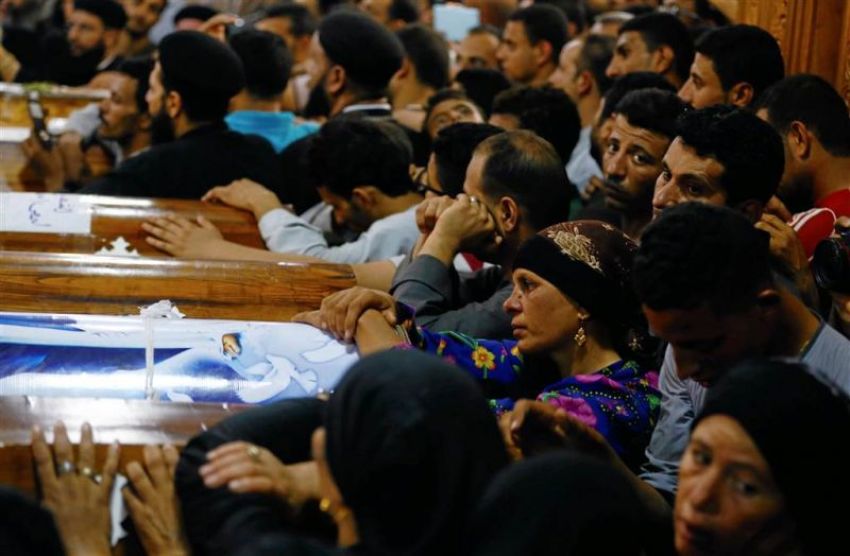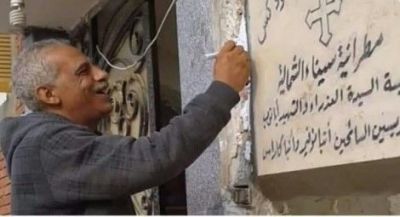ISIS executes Coptic businessman in Egypt, sends message to 'all crusaders in the world'
Church, family mourn death: 'A saint in the highest places of heaven'

Islamic State-linked terrorists killed a Coptic Christian man kidnapped in November and two others in Egypt, as Christians and those who support the Egyptian army continue to face terror in the Sinai region.
A 13-minute video circulated by Islamic State media platforms Saturday showed Nabil Habashi Salama, a 62-year-old businessman and member of Egypt’s minority Coptic Orthodox Church, being shot in the head by a terrorist in the desert.
A video screenshot showed Salama kneeling with his head down as the three militants stood behind him holding rifles with their faces blurred out.

“As for you Christians of Egypt, this is the price you are paying for supporting the Egyptian army,” a militant was quoted as saying in the video.
The released video also showed two young Sinai tribesmen being shot and killed in the desert by masked militants, who accused them of fighting alongside the Egyptian military, according to Agence France Presse.
The militants used the video to send a message to "all crusaders in the world," Egypt Today reports.
"As you kill, you will be killed, and as you capture, you will be captured," a militant was quoted as saying.
On Monday, Egypt’s interior ministry confirmed that it killed the three “terrorist elements” linked to the Coptic man’s execution after an “intense firefight” with security forces. A search is on for other suspected members of the terror cell.
The statement said the suspected terrorists had plans to carry out terror operations against homes and Coptic houses of worship, according to AFP. The ministry noted that security forces found a suicide belt and hand grenade in the militants’ possession.
A group affiliated with the Islamic State has claimed responsibility for the attack.
Even though Salama has been missing since November, Middle East Monitor reports that Salama stated in the video released over the weekend that he had been held by the Islamic State-linked Wilayat Sinai group for three months. He claims to have been charged with the “crime” of building the only church in Bier El-Abd in North Sinai.
Salama stated that the militants accuse the Coptic Church of collaborating with the army.
Salama was abducted in broad daylight from northern Sinai in November 2020, and captors demanded a ransom of 5 million Egyptian pounds (about $318,000), according to the United Kingdom-based nonprofit watchdog group Christian Solidarity Worldwide.
According to the organization, Salama’s family owned jewelry and mobile phone businesses in Bir Al-Abed and built the town’s Saint Mary & Anba Karas & St Abanob Church.
The Coptic Orthodox Church and Salama's family mourns their loss but celebrates the dedication of his faith until the point of martyrdom.
“He kept the faith till the moment he was killed. ... The church affirms its steadfast support of the Egyptian state’s efforts in quelling hateful terror acts,” a spokesperson for the Coptic Church said in a statement.
In a statement shared by Archbishop Angaelos of the Coptic Orthodox Church, Salama’s son Peter said, “we are currently telling our kids that their grandfather is now a saint in the highest places of heaven.”
“… He poured his heart and soul into this church, and always said, ‘do not think that I am building this church for here; I am building for myself a home in heaven,’” he continued.
“In their efforts to have him abandon the faith, they humiliated my father and broke all his teeth to torture him. Yet, through all this, he held on, and we are so joyful for him."
The son told an Egyptian newspaper that his family fled their homes and closed their businesses after their father’s kidnapping and continued to receive threats.
A jihadist insurgency has afflicted the northern Sinai region of Egypt since at least 2011 following the election of Islamist Muslim Brotherhood-affiliated President Mohamed Morsi.
Extremist groups like Al-Qaeda and Wilayat Sinai have targeted Christians in the region. The jihadist insurgency further intensified in 2013 when the army overthrew the Morsi government.
According to Open Doors USA, there has been an increase in violent Islamic militancy in the Sinai region near the border with Gaza, which has led to Egyptian security forces conducting regular operations in the area.
In its annual country dossier on Egypt, the watchdog group stated that it is “very difficult to control the entire [Sinai] area and the security forces cannot prevent militant groups from attacking undermanned checkpoints and sometimes civilian targets.”
The Islamic State specifically called for attacks on Christians in Sinai in 2017, calling them “our first target and favorite prey.” This led to the storming and burning of Coptic homes, the killing of residents and a trend of other attacks against Christians in Egypt.
A string of attacks against Christians in early 2017 caused hundreds of Christians to flee North Sinai in fear for their own lives.
On Palm Sunday in 2017, bombings of two churches in Tanta and Alexandria killed nearly 50 Coptic Christians and wounded over 100 more.
Egypt launched a nationwide military operation against the militants in February 2018, focusing specifically on North Sinai. Nearly 1,000 suspected militants have died in the campaign.
Egyptian Coptic Christians were nominated for the 2018 Nobel Peace Prize for their refusal to retaliate against recent anti-Christian acts of violence.
This month, religious persecution watchdog group International Christian Concern reported that a driver of a three-wheel vehicle murdered a Coptic Christian woman and her 6-year-old son.
Female Christians in Egypt are especially vulnerable since the media stigmatizes women who do not wear a veil.
Open Doors ranked Egypt No. 16 on its annual World Watch List of countries where Christian persecution is most severe due to a “very high” level of persecution.



























